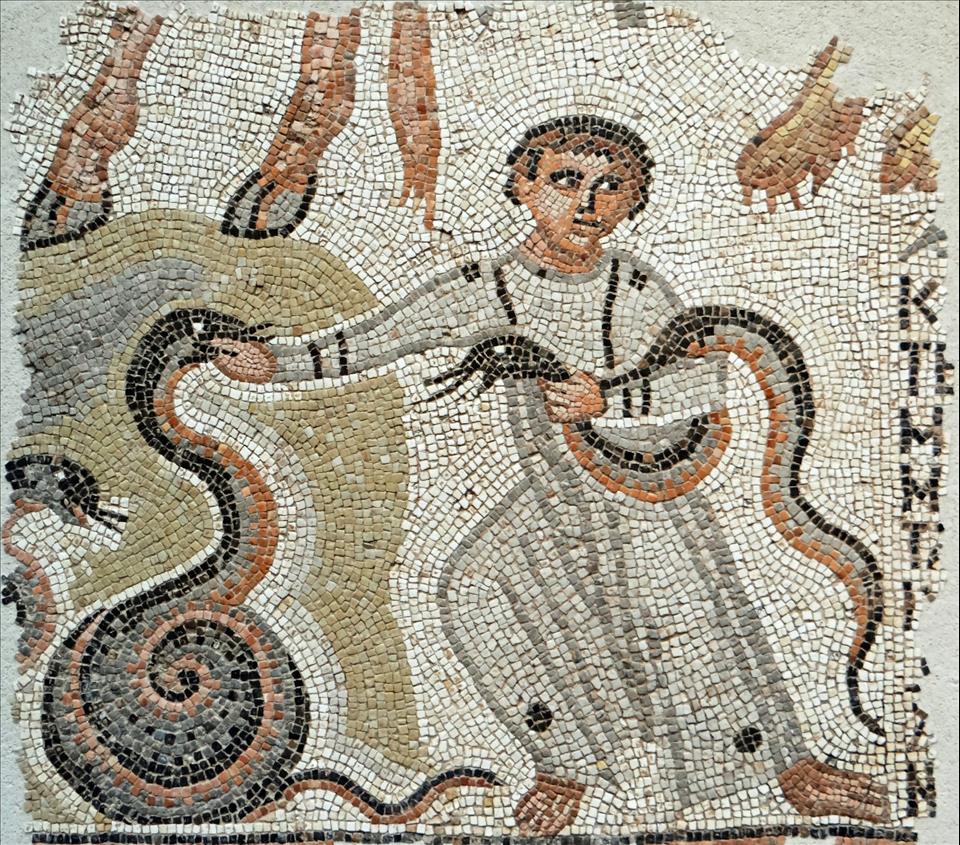
Like Your Pet More Than People? So Did Some Of The Greco-Romans
The boy was lucky. His pet snake remembered his earlier kindness, and came to save him in his moment of need, if we can believe the story.
This is one of many tales from the Greco-Roman world about people and their pets.
Just like today, people back then loved and enjoyed the company of animals in their homes. So, what sorts of pets did they keep and what do we know about them?
Some famous stories about petsMany stories about pets survive from Greco-Roman times. These stories usually attest to the close bonds humans and animals can form with one another.
Here are a few of them.
One day, the Roman general Paulus Aemilius (229–160 BCE) arrived home after work and found his little daughter Tertia crying.
Why was she crying? The biographer Plutarch (1st–2nd century CE) tells us what happened:
Perseus was the name of their pet dog. We don't know what Perseus died from, but Paulus' daughter was obviously deeply fond of the animal.
Red-figure vase painting of a boy playing an instrument with a little Melitaean dog walking in front of him and a bird walking behind him - probably his pets. Athens, 420–400 BCE. British Museum
In some ancient stories, people's pets were sometimes their only source of support in difficult times.
The Theban general Epaminondas (410–362 BCE) was charged with various petty crimes by his political enemies at Thebes. After proving himself innocent of the charges in court, he finally got to go home :
The philosopher Lacydes of Cyrene (died 205 BCE) had a close bond with his pet goose :
But one of the most famous ancient pet stories is about Darius III (died 330 BCE), the King of Persia. He was defeated by Alexander the Great and then betrayed by one of the Persians, called Bessus :
Darius' dog stayed loyal to him to the end, unlike the people around him.
Different types of petsDogs were the most popular house pet in Greco-Roman times. The favourite breed of dog was called the Melitaean .
This breed of dog was originally from Carthaginian Africa. It was very small with long hair, a bushy tail and sharp nose, and apparently barked with a squeaky voice.
Other favourite pets were monkeys, snakes and birds of many different kinds. Even the Roman emperor Tiberius (42 BCE to 37 CE) had a pet snake.
Pet cats of the kind we are familiar with were, for a long time, mainly found in Egypt. The Egyptians' word for“cat” actually sounded like the noise cats make,“meow”.
A red-figure vase painting of a man with a big cat (probably a cheetah). Athens, circa 490 BCE. British Museum
Ancient Greeks and Romans seem not to have kept these sorts of household cats as pets.
But there is evidence that in Athens in the 5th century BCE, it was trendy for wealthy people to own exotic big cats such as cheetahs, possibly for hunting purposes.
Some wealthy people even had lions as house pets. For example, Berenice (273–226 BCE), wife of Ptolemy III of Egypt, had a tame lion as her companion.“It would softly wash her face with its tongue and smooth away her wrinkles”, says Aelian. It would also eat at her table at dinnertime.
The loyalty of animalsAncient writers such as Aelian praised animals for their loyalty.
Aelian says animals become loyal when you do simple things for them like giving them food and love, whereas human beings can be disloyal no matter how much you do for them:
Aelian gives as an example of this the story of a boy who was given a baby eagle to care for:
So, if there's one message that Greco-Roman writers give about pets, it's that the bonds between humans and animals can sometimes be stronger than the bonds between humans and other humans.

Legal Disclaimer:
MENAFN provides the
information “as is” without warranty of any kind. We do not accept
any responsibility or liability for the accuracy, content, images,
videos, licenses, completeness, legality, or reliability of the information
contained in this article. If you have any complaints or copyright
issues related to this article, kindly contact the provider above.
Most popular stories
Market Research
- Thinkmarkets Adds Synthetic Indices To Its Product Offering
- Ethereum Startup Agoralend Opens Fresh Fundraise After Oversubscribed $300,000 Round.
- KOR Closes Series B Funding To Accelerate Global Growth
- Wise Wolves Corporation Launches Unified Brand To Power The Next Era Of Cross-Border Finance
- Lombard And Story Partner To Revolutionize Creator Economy Via Bitcoin-Backed Infrastructure
- FBS AI Assistant Helps Traders Skip Market Noise And Focus On Strategy




















Comments
No comment